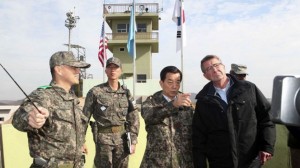
US, South Korea vow to strengthen defenses against North Korea
SEOUL, South Korea – he U.S. and South Korea are pledging to strengthen their combined defenses against what they call threats by North Korea, but announced no specific new steps toward a long-delayed transfer of wartime control of South Korean forces from the U.S. military to the South Korean government.
U.S. Defense Secretary Ash Carter said the two countries agreed that transfer of wartime control would happen after the South develops a stronger capability to counter the North’s artillery force and after it improves its command and control of military forces and its intelligence capabilities. But further details were not made public.
Carter called North Korea an “up-close, dangerous and continuing threat.”
Carter appeared at a news conference with his South Korean counterpart, Han Min-koo, who said his country would not tolerate further military provocations by the North.
In a joint written statement issued after closed-door meetings, they condemned North Korea’s recent suggestion that it intends to conduct a long-range missile launch or nuclear test.
Of particular worry in South Korea is the North’s nuclear arsenal, which may be expanding in defiance of international efforts to persuade Pyongyang to give up its nuclear weapons and long-range missiles, which could pose a threat not only to the South but also to Japan and others.
“In the face of increasing threats, especially in the form of nuclear and missile threats from North Korea, we also agreed that the alliance needs to work in various ways to cooperate and to rise against and respond against these threats,” the South Korean defense minister, Han, said at the outset of the annual security consultations.
Carter said the alliance “has never been stronger,” and he called the American commitment to South Korea “iron-clad.”
Also participating in the Seoul talks were the new chairman of the U.S. Joint Chiefs of Staff, Marine Gen. Joseph Dunford, and the commander of U.S. Pacific Command, Adm. Harry Harris. Dunford also was planning to visit the heavily guarded buffer zone separating North and South Korea. Harris was scheduled to fly to Beijing for his first visit to China as commander of Pacific forces.
The South Koreans have had peacetime control of their forces since 1994. The U.S. assumed full control of South Korean forces during the 1950-53 Korean War and has kept a sizeable U.S. troop presence here ever since to rebuild South Korean forces, to demonstrate U.S. resolve and to deter another North Korean invasion. The South Korean military now is one of the ablest in Asia.
But the issue of when to return wartime control to the South Koreans has bedeviled the allies for at least a decade. In practical terms, it means ending the current arrangement in which an American four-star officer, currently Army Gen. Curtis Scaparrotti, would take operational control of South Korean troops in the event of war with the North, in addition to leading U.S. troops.
In 2006, near the end of his tenure as defense secretary, Donald H. Rumsfeld argued for pushing Seoul to take more responsibility for its defense and proposed to transfer wartime control of South Korean forces as early as 2009. The South Koreans argued for extra time, and the two sides agreed it would happen by 2012.
But the timetable was pushed back to 2015 amid increased tensions with the North, including North Korean nuclear weapons tests in 2009 and 2013, and an episode in 2010 in which Washington and Seoul accused North Korea of torpedoing the Cheonan, a South Korean naval vessel.
Last year the two allies agreed to postpone it indefinitely, saying it would happen on a “conditions based” timetable that includes completing improvements and upgrades to certain key elements of South Korean defenses. These include South Korean missile defenses and intelligence, surveillance and reconnaissance, as well as Seoul’s ability to counter the North’s enormous artillery and rocket forces.
The issue of returning wartime control of South Korean forces is highly sensitive. The South Koreans want it as a matter of national pride, but some fear it will change the U.S.-South Korean military and political relationship in ways that could leave the South more vulnerable to the North.




